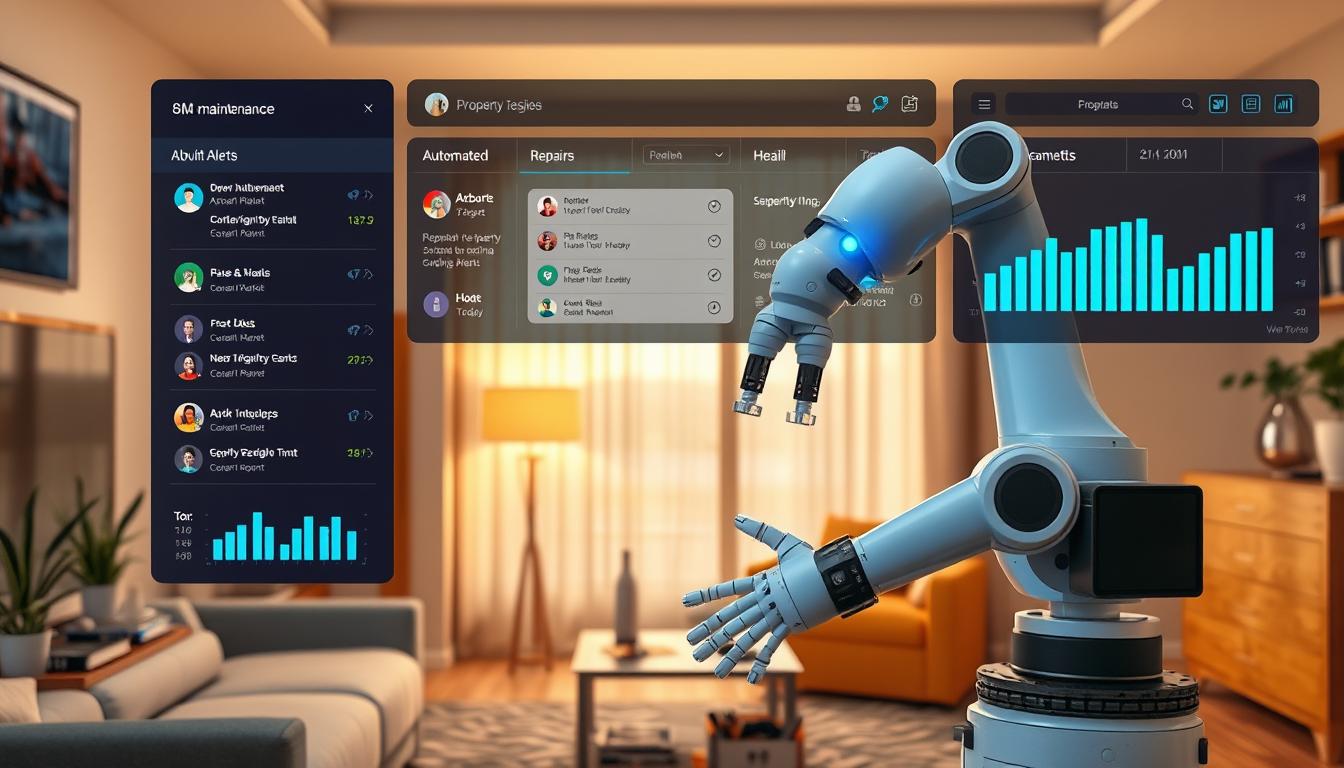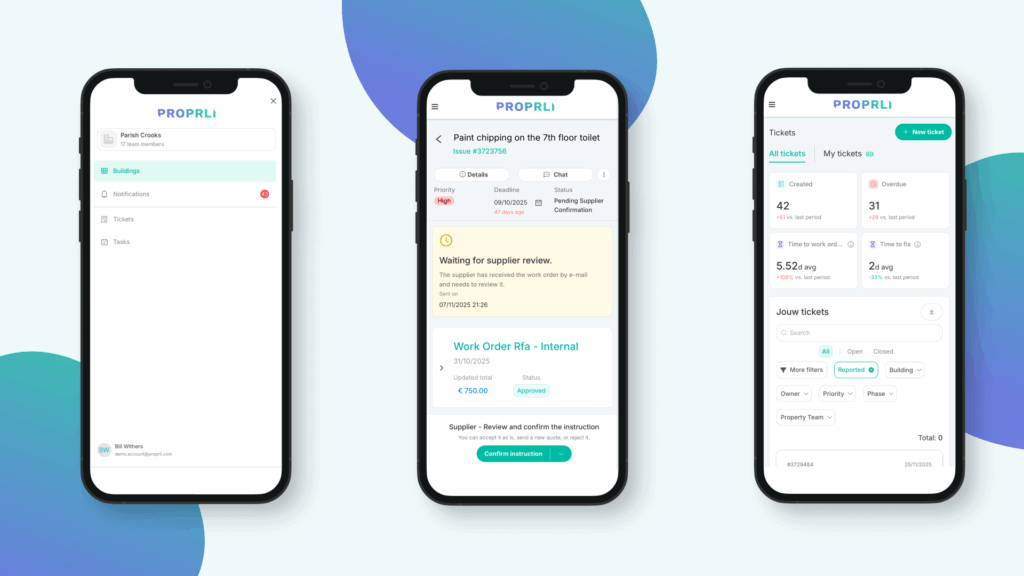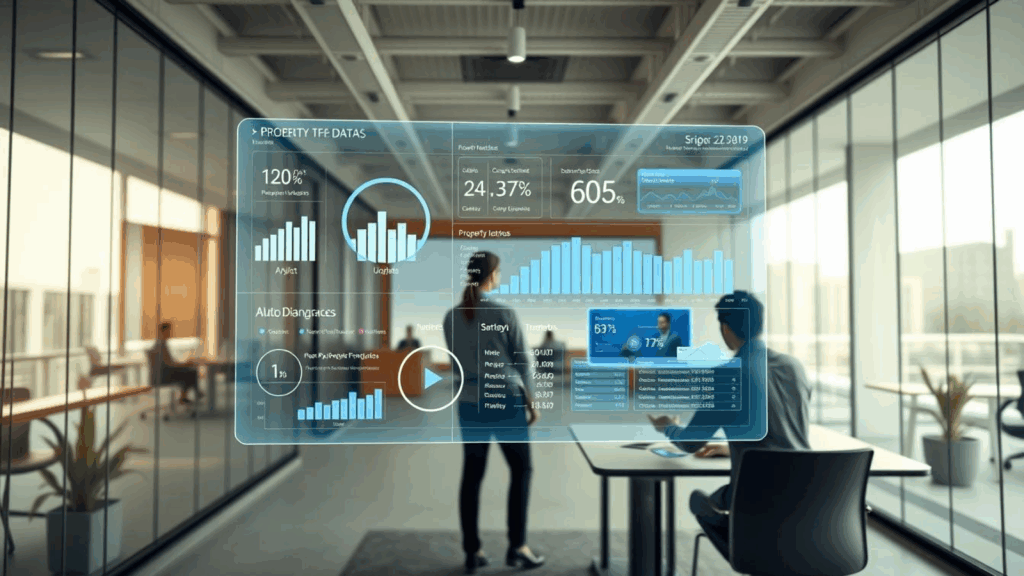In the ever-evolving landscape of property management, automation has become a game-changer. It streamlines technical management processes. With smart home technology, automated scheduling, predictive maintenance, and cloud-based monitoring, property managers can now optimize efficiency. They can also improve accuracy and enhance the resident experience.
By leveraging these advanced tools, property management companies can stay competitive. They can achieve greater net operating income (NOI).
Recent studies reveal that 38% of industry professionals recognize the necessity of automation in maintenance tasks. Automated alerts and notifications significantly reduce response times to tenant queries and maintenance requests. Centralized processes and information improve the execution of preventive maintenance and the management of certificates of insurance.
Furthermore, the integration of IoT sensors and remote diagnostics enables real-time monitoring. Immediate issue resolution before escalation minimizes disruptions. It ensures optimal property performance.
By embracing property management maintenance automation, companies can save staff time and reduce errors. They can increase efficiency, profitability, and tenant satisfaction. The 2023 Property Management Operations Report highlights the growing trend of multifamily companies adopting centralization and automation tactics.
As the digital evolution continues to shape the industry, those who adapt and integrate these innovative solutions will undoubtedly gain a competitive edge in the market.
Key Takeaways
- Automation in maintenance tasks is crucial for staying competitive in property management
- Automated alerts and notifications improve response times and tenant satisfaction
- Centralization of processes and information enhances preventive maintenance and COI management
- IoT sensors and remote diagnostics enable real-time monitoring and issue resolution
- Embracing property management maintenance automation leads to increased efficiency, profitability, and happier tenants
The Transformation of Commercial Real Estate with Automated Property Management
The commercial real estate sector is undergoing a significant transformation, with automated property management leading the charge. Property managers are now leveraging digital platforms to streamline operations, enhance tenant experiences, and optimize asset performance. This shift towards automation is essential to meet the demands of modern tenants and the complexities of managing properties in today’s fast-paced world.
Tenant service apps are a key driver in this transformation. These apps offer a seamless digital interface for tenants to communicate with property managers, submit maintenance requests, and access important building information. By automating routine interactions, these apps save time, reduce miscommunication, and boost tenant satisfaction. In fact, a recent survey showed properties with tenant service apps saw a 25% increase in tenant retention rates compared to those without.
Real estate management software is another crucial aspect of the automated property management revolution. These tools centralize and automate various aspects of property management, from lease administration and financial reporting to maintenance scheduling and vendor management. By using these software solutions, property managers can gain a comprehensive view of their portfolios, make data-driven decisions, and identify opportunities for optimization. A study by the National Association of Realtors found that property managers who adopted real estate management software reported a 30% increase in operational efficiency and a 15% reduction in operating costs.
The Internet of Things (IoT) is also playing a key role in the transformation of commercial real estate management. IoT connects various building systems and devices to the internet, enabling real-time monitoring, remote control, and predictive maintenance. For example, IoT sensors can detect leaks, monitor energy consumption, and track occupancy levels, providing valuable insights to optimize building performance and reduce costs. According to a report by Deloitte, the implementation of IoT in commercial real estate has the potential to generate up to $1.2 trillion in value by 2025.
The impact of automated property management on the commercial real estate industry is far-reaching and transformative. Consider the following statistics:
- 46% of property management teams find tenant issue management highly time-consuming.
- 38% of CRE professionals indicate that preventive maintenance tasks are a prime candidate for automation.
- 37% of property teams believe certificate of insurance (COI) management is ripe for automation.
By addressing these pain points through automation, property managers can unlock significant benefits, including:
| Benefit | Impact |
|---|---|
| Cost savings | Reduced workload on property managers and minimized human errors |
| Tenant satisfaction | 24/7 support through AI-powered chatbots and virtual assistants |
| Informed decision-making | AI algorithms analyze vast amounts of data to offer insights into market trends, tenant behavior, and property performance |
| Predictive maintenance | IoT devices and AI predict maintenance needs, preventing costly repairs and prolonging asset lifespan |
As the commercial real estate industry continues to evolve, the adoption of automated property management will become increasingly critical for staying competitive and meeting the expectations of modern tenants. By embracing digital property management platforms, tenant service apps, real estate management software, and the Internet of Things, property managers can position themselves at the forefront of this transformation and drive long-term success in the dynamic world of commercial real estate.
Enhancing Tenant Issue Management Through Automation
In the ever-evolving landscape of property management, automating tenant issue management has become a game-changer. Advanced property management software now streamlines handling tenant concerns and maintenance requests. These systems feature automated helpdesk systems for quick communication between tenants and managers.
The days of manual tracking and endless phone calls are behind us. Modern solutions offer self-service options that empower tenants to report issues at their convenience. Whether it’s a leaky faucet or a malfunctioning appliance, tenants can submit requests through user-friendly apps or websites. This saves time for both parties and ensures no issue goes unnoticed.
Once a tenant submits a request, the automated tenant issue management system acts swiftly. It generates a ticket and assigns it to the right maintenance team or contractor. This eliminates manual intervention and ensures prompt issue resolution. Tenants also receive real-time updates on their request’s progress, keeping them informed at every step.
The benefits of automating tenant issue management are vast. Here are some impressive statistics:
- Automation in property management has significantly reduced manual tasks, allowing managers to focus on more complex responsibilities.
- Maintenance requests are streamlined with automation tools that enable tenants to submit requests through apps or websites, leading to a smoother process for both tenants and managers.
- 40% of property managers reported a decrease in maintenance costs and a 25% improvement in response times due to AI-driven predictive maintenance systems in a survey by the Indian Institute of Property Management.
- Automating property maintenance processes can enhance tenant satisfaction and help turnover properties faster for new occupants.
The impact of automation on tenant issue management is clear. By using cutting-edge technology, property managers can offer superior service to tenants. Automated systems streamline processes, improve communication, and foster transparency. Tenants feel heard and valued, knowing their concerns are efficiently addressed.
As the real estate industry evolves, embracing automation in tenant issue management is essential. Property managers who adopt these innovative solutions will meet tenant expectations and stay competitive. The future of property management relies on automation to create a seamless and satisfying experience for all stakeholders.
Centralized Compliance Management and Certificate of Insurance (COI) Management with Automation
In today’s fast-paced business world, property managers are turning to Compliance management software and COI tracking software to streamline their compliance management processes. This technology centralizes COI data in a secure repository. It enables property teams to efficiently monitor and verify insurance compliance for their vendors and tenants.
One of the key benefits of COI tracking software is its ability to automate renewal alerts. This ensures that property managers never miss an expiration date. Such proactive measures help mitigate the risks associated with lapsed COIs, which can lead to costly penalties and potential liabilities.
COI tracking software also offers customizable verification workflows. This allows property teams to tailor the system to their specific requirements. The flexibility enables managers to effectively address exclusions and reductions in insurance coverage. This further enhances their risk management strategies.
- Reduces errors by automating tasks and increasing accuracy
- Saves time and reduces labor costs through process automation
- Enhances compliance and improves overall risk management
- Integrates seamlessly with existing systems and workflows
By implementing COI tracking software, property managers can experience a range of benefits. These include:
| Benefit | Description |
|---|---|
| Streamlined Insurance Management | Centralized COI data and automated processes simplify insurance tracking and verification |
| Enhanced Compliance | Automated renewal alerts and customizable workflows ensure consistent compliance |
| Improved Risk Management | Mitigates risks associated with lapsed COIs and inadequate coverage |
| Cost Savings | Reduces manual errors and labor costs while avoiding potential penalties |
Across various industries, including real estate, construction, healthcare, and retail, COI tracking software is proving invaluable. It is a key tool for managing compliance and reducing vendor-related risks. By embracing this technology, property managers can streamline their operations. They also gain peace of mind, knowing their COI management process is efficient, accurate, and secure.
Embracing Digital Evolution in Property Management
The property management sector has seen a major shift, with digital asset management now crucial for streamlining operations. Adopting a digital-first strategy allows managers to meet the changing needs of owners and tenants. Cloud-based solutions have transformed the field, enabling managers to manage their portfolios from anywhere, anytime. This brings unmatched agility and responsiveness.
Integrating digital systems into property management offers significant benefits. Managers have real-time access to critical data, enabling them to make informed decisions quickly. This leads to more efficient operations and better decision-making. Digital tools also enhance communication between managers and tenants, offering features like messaging apps and online portals.
The digital transformation in property management has brought numerous advantages. Here are some key statistics:
- Automated tools handle lease agreements, rent collection, maintenance requests, and tenant communications efficiently.
- Tenants enjoy a better experience, able to pay rent, submit maintenance requests, and communicate with managers digitally, boosting satisfaction.
- Advanced analytics provide insights into tenant behavior and market trends, aiding in smarter decisions on pricing and retention.
- Smart devices through IoT enable real-time monitoring and control, reducing costs.
- Cloud-based solutions allow remote management, reducing the need for on-site visits.
The digital evolution has also transformed maintenance processes. Traditional methods were often error-prone and time-consuming. However, digital solutions offer real-time monitoring, proactive planning, and better resource utilization.
| Traditional Maintenance | Digital Maintenance |
|---|---|
| Error-prone documentation | Accurate, real-time data |
| Time-consuming processes | Streamlined, efficient workflows |
| Reactive approach | Proactive maintenance planning |
| Lack of visibility | Real-time monitoring and reporting |
Embracing digital evolution in property management, especially in maintenance automation, is a game-changer. By using facility management software and CMMS, managers can centralize maintenance, boost productivity, and reduce downtime. This leads to enhanced operational efficiency and better resource utilization.
Automated Systems and the Future of Management
The real estate industry is rapidly adopting technological advancements, leading to a revolution in property management. AI-powered systems are now streamlining processes, boosting efficiency, and enhancing the tenant experience. By 2028, the global AI in real estate market is projected to hit $8.9 billion, with a CAGR of 23.7% from 2021.
Online property management platforms are transforming lease management. They enable property managers to manage tenant leases, send renewal reminders, and create new lease agreements with ease. AI-driven tools analyze market trends to set optimal rental prices, ensuring high occupancy and profitability.
Maintenance management is another area where automation is significantly impacting. AI systems predict equipment failures by analyzing IoT sensor data and historical maintenance records. This predictive approach reduces unexpected breakdowns, extends asset lifespan, and boosts tenant satisfaction. Automated systems allow tenants to request repairs online, automatically notifying maintenance staff and scheduling appointments.
| AI-Powered Property Management Tasks | Benefits |
|---|---|
| Automated rent collection and reminders | Reduces late payments and improves cash flow |
| AI-powered tenant screening | Identifies potential risks and aids in informed decision-making |
| AI chatbots and virtual assistants | Provides 24/7 tenant support and reduces staff workload |
| Predictive analytics for maintenance | Optimizes operations and prevents costly repairs |
Financial processing is also being streamlined through automation. AI helps property managers forecast cash flow, identify financial risks, and make informed decisions about investments. Automated rent collection systems powered by AI significantly reduce late payments and improve cash flow.
As the real estate industry evolves, the adoption of automated systems and AI solutions will become essential for property managers to remain competitive. By embracing these technologies, property managers can optimize operations, enhance tenant satisfaction, and achieve long-term success in the dynamic property management landscape.
Integrating Smart Home Technologies for Enhanced Property Oversight
The rise of smart home technology has transformed property management, offering numerous benefits for both managers and tenants. Digital asset management systems enable remote monitoring and control of properties. This includes temperature, lighting, security, and energy use. Such oversight boosts tenant comfort and facilitates proactive maintenance, leading to cost savings.
Smart thermostats are a cornerstone of smart homes. They adjust indoor temperatures based on occupancy and preferences, cutting energy costs and improving satisfaction. They also help identify inefficiencies, allowing for targeted solutions to reduce expenses further.
Security is a vital area where smart home tech shines. Security cameras enable remote surveillance, offering peace of mind. Smart locks offer keyless entry and access tracking, boosting convenience and security. Smart leak detectors detect issues early, alerting managers to prevent damage and costly repairs.
| Smart Home Technology | Benefits for Property Managers |
|---|---|
| Smart Thermostats | Remote temperature control, energy savings, tenant comfort |
| Security Cameras | Remote surveillance, increased security, peace of mind |
| Smart Locks | Keyless entry, access tracking, enhanced security measures |
| Leak Detectors | Early detection, water damage prevention, cost savings |
Integrating smart home technologies showcases a commitment to innovation in property management. It positions properties as cutting-edge and focused on tenant needs. As the commercial real estate sector evolves, these solutions will be key for managers aiming to streamline operations, improve tenant experiences, and stay competitive.
Digital Property Management: Centralizing Operations with Innovation
The digital era has brought a new era to property management, marked by centralizing operations through advanced software. These platforms integrate lease management, maintenance, and financial reporting seamlessly. This centralization streamlines workflows, boosts efficiency, and enables data-driven decisions.
Property portfolio software allows managers to manage assets from one interface. This approach eliminates the need for multiple systems and manual processes. It saves time and reduces errors. Features like automated rent collection and lease tracking offer a comprehensive view of property performance.
Centralizing property management through software greatly simplifies lease management. It handles marketing, applications, and lease agreements efficiently. Managers can track lease expirations and renewals, ensuring proactive tenant retention.
| Property Management Task | Traditional Approach | Centralized Software Approach |
|---|---|---|
| Lease Management | Manual tracking of leases and renewals | Automated lease tracking and renewal reminders |
| Maintenance Coordination | Phone calls and paper work orders | Digital maintenance requests and work order management |
| Financial Reporting | Spreadsheets and manual data entry | Real-time financial insights and automated reporting |
Maintenance coordination is another area where software excels. It offers a digital platform for maintenance requests and work order management. This streamlines maintenance, improving tenant satisfaction and property longevity.
Financial reporting also benefits from centralization. Property portfolio software integrates with accounting systems, providing real-time financial insights. Managers can monitor rent, expenses, and generate reports, ensuring financial transparency and informed decision-making.
The adoption of digital property management solutions is on the rise, with over 80% of managers seeing efficiency gains. As the market expands to $2 billion by 2024, centralization through innovation is the industry’s future. Embracing these tools positions managers for success in a competitive market.
The Benefits of Automating Property Management
Multifamily automation solutions are transforming the property management sector. They streamline operations, boost productivity, and enhance profitability. By automating tasks, property managers save time, reduce errors, and improve the resident experience.
Automating tasks saves about 30 hours weekly. This time gain allows property managers to focus on strategic initiatives. It improves their efficiency. Tasks like responding to inquiries, managing maintenance, and rent collection are automated, reducing the team’s workload.
Maintenance requests, a common task, are efficiently managed through automation. Property management software directs these requests to service companies promptly. This ensures timely resolution and boosts tenant satisfaction.
| Automated Task | Time Saved | Benefits |
|---|---|---|
| Responding to Emails | 2 hours per day | Improved team productivity |
| Rent Collection | Variable | Attracts quality renters who prefer online payments |
| Pre-Qualification | Variable | Filters out poor leads, improves leasing efficiency |
Automating rent collection is another key advantage. It offers online payment options, attracting renters who value digital payments. This streamlines the process, optimizing receivables and payables for higher profitability.
Property management software also enables personalized experiences for potential tenants. Automated marketing messages tailored to their needs engage them effectively. This targeted approach increases leasing efficiency and occupancy rates.
- Businesses lose 20-30% of revenue annually due to inefficient processes
- Workers spend approximately 520 hours per year on repetitive tasks
- Increased automation leads to faster turnovers and make-readies
By adopting multifamily automation solutions, property management companies can boost productivity and profitability. They also enhance resident satisfaction and retention. Automated processes lead to faster turnovers, reduced expenses, and improved success in property management. As the industry evolves, those embracing automation technologies will thrive in the competitive property management landscape.
Key Property Management Tasks to Automate
In today’s fast-paced property management landscape, automating key tasks can significantly streamline operations and enhance efficiency. By focusing on automating rent & dues collections, utility management, resident communication, and maintenance requests, property managers can save time, reduce errors, and improve the overall resident experience.
One of the most critical areas to automate is rent & dues collections. Implementing online payment systems that accept various payment methods, such as credit cards, ACH transfers, and digital wallets, can make it easier for residents to pay their rent on time. Additionally, utilizing lockbox services to convert paper checks into digital payments and CashPay to accept cash and money orders as digital payments further streamlines the process.
Utility management is another area where automation can make a significant impact. By implementing utility expense management systems, property managers can automate the entire utility accounts payable process, reducing the time and effort required to manage utility bills. Furthermore, automating resident utility billing allows property managers to accurately recover residents’ share of utility expenses, ensuring fair distribution of costs.
Effective resident communication is essential for maintaining a positive living experience. Automating resident communication through community mobile apps enables residents to self-serve for various tasks, such as submitting maintenance requests, receiving package notifications, reserving amenities, and granting guest access. This not only improves the residents’ experience but also reduces the workload on property management staff.
Maintenance requests are a crucial aspect of property management that can greatly benefit from automation. By implementing an online maintenance request system, residents can easily submit requests, and property managers can efficiently assign and track work orders. Automated notifications and reminders ensure that maintenance issues are addressed promptly, minimizing potential damage and resident dissatisfaction.
- Automate rent & dues collections with online payment systems, lockbox services, and CashPay
- Streamline utility management through utility expense management and resident utility billing
- Enhance resident communication with community mobile apps for self-service
- Simplify maintenance requests with an online system for submission, assignment, and tracking
By automating these key property management tasks, property managers can save time, reduce manual labor, and improve the overall efficiency of their operations. Embracing automation not only benefits the property management team but also enhances the living experience for residents, leading to increased satisfaction and retention.
Property Management Maintenance Automation: A Game-Changer in Streamlining Operations
Property management maintenance automation is transforming the daily tasks of property managers. It offers a more efficient and streamlined approach to operations. By embracing automation, property managers can achieve greater efficiency, accuracy, and profitability. This leads to an increase in net operating income (NOI).
One of the most significant advantages of property management automation is the substantial time savings it provides. Automating tasks like lease agreements, property inspections, and rent payment processing frees up valuable time. This allows property managers to focus on more critical responsibilities, such as tenant satisfaction and property improvements.
| Task | Traditional Approach | Automated Approach |
|---|---|---|
| Rent Collection | Manual processing, increased risk of late or missed payments | Automated reminders, online payment options, reduced risk of late payments |
| Maintenance Requests | Phone calls, emails, manual tracking | Online submission, modern communication tools, improved tenant satisfaction |
| Lease Management | Manual tracking of lease expiry dates, paperwork | Automated lease expiry tracking, renewal notices, reduced administrative burden |
| Financial Reporting | Manual data entry, increased risk of errors | Automated expense tracking, budgeting, and reporting, valuable insights for decision-making |
Implementing property management maintenance automation offers a wide range of benefits. Property managers can experience:
- Streamlined rent collection processes, reducing the risk of late or missed payments
- Efficient handling of maintenance requests, improving tenant satisfaction and reducing stress
- Automated lease management, minimizing administrative burden and facilitating seamless renewals
- Enhanced financial reporting and expense tracking, providing valuable insights for data-driven decision-making
Embracing property management automation benefits property managers, tenants, and property owners. Tenants enjoy a simplified experience with easy rent payments and prompt maintenance responses. This leads to higher retention rates and positive referrals. Property owners gain access to real-time data and reports through automated dashboards. This provides visibility into investment performance and financial metrics.
As the real estate industry continues to evolve, property management maintenance automation is becoming essential. It helps achieve greater efficiency, increase NOI, and stay competitive in the market. By streamlining their operations. They can reduce manual errors and focus on delivering exceptional service to their tenants and property owners.
Conclusion
Property management maintenance automation is revolutionizing the real estate industry. It streamlines technical management and boosts efficiency. By adopting digital solutions and automating processes, property managers see significant improvements. Automated tenant screening cuts approval time by up to 50%. Automated rent collection reduces late payments by 30%, enhancing cash flow.
Automated maintenance systems cut response times by 40%, boosting tenant satisfaction and reducing downtime. The use of AI, smart home tech, and predictive analytics further boosts efficiency. These tools enable data-driven decisions, offering numerous benefits like cost savings and improved accuracy.
The industry is entering an era of automation, and those embracing it will thrive. Automation streamlines tasks, centralizes operations, and leverages technology. This leads to greater efficiency, cost reduction, and a better tenant experience. The future of property management depends on adopting maintenance automation technologies, ensuring a more efficient and profitable industry.
FAQ
What is property management maintenance automation?
Property management maintenance automation uses advanced technology to manage properties more efficiently. It automates tasks like rent payments, utility management, and communication with residents. This saves time and effort for property managers. By using these solutions, companies can improve efficiency, accuracy, and the resident experience, leading to higher NOI.
How does automated tenant issue management work?
Automated tenant issue management uses property management software with automated helpdesk systems. These systems enable quick information exchange between tenants and managers. From reporting an issue to tracking its resolution, the process is streamlined. This includes automated ticket generation and real-time tracking, ensuring tenants are informed at every step.
Innovative solutions empower tenants to report issues anytime, check updates, and find resources for minor problems. This empowers them to handle minor issues independently.
What are the benefits of preventive maintenance software?
Preventive maintenance software is a strategic advantage in commercial real estate. It allows managers to assign the right technicians confidently and track all activities from one platform. IoT solutions make the process even more precise, enabling real-time monitoring and adjustments.
This approach transforms reactive maintenance into proactive, preventing costly repairs and downtime. Real-time issue detection prompts immediate action, while data analytics support predictive maintenance, averting breakdowns.
How does COI tracking software help in property management?
COI tracking software centralizes and simplifies insurance document handling, bringing digital ease to property managers. It reduces manual errors common in traditional insurance document handling. This software provides a secure, centralized repository for quick access, updates, and retrieval of crucial insurance information.
Automated alerts make it easier to stay on top of renewals and compliance, keeping managers informed of policy expirations and necessary updates.
What are the advantages of digital asset management in property management?
Digital asset management allows managers to oversee their portfolio from anywhere, anytime. It brings agility and responsiveness to the industry. The main advantage is real-time data accessibility, putting critical information at managers’ fingertips for prompt decision-making.
How does property management automation streamline operations?
Property management automation efficiently handles routine tasks through automated systems. These systems manage tenant leases, send renewal reminders, and assist in generating new lease agreements. Online systems enable tenants to submit repair requests, automatically notifying maintenance staff and tracking progress.
This level of convenience and control significantly streamlines property management operations.
What are the key components of smart home technology in property management?
Smart home technology boosts convenience and operational efficiency for property managers. Key components include smart thermostats for remote climate control, security cameras for surveillance, smart locks for keyless entry, and leak detectors for early detection. Digital asset management allows managers to monitor energy usage and predict maintenance needs, enhancing the tenant experience.
This enables swift responses to issues and prevents them before they occur.
What are the main benefits of automating property management operations?
Automating property management operations increases productivity and efficiency for on-site staff. It provides visibility into portfolio-wide insights, eliminating manual data entry to reduce errors. It offers a better resident experience through improved communication and self-service, and higher profitability through optimized receivables and payables.
What are the key property management tasks to automate?
Key tasks to automate include rent and dues collections, utility management, and resident-related tasks like communication and maintenance requests. Online payment systems, lockbox services, and CashPay can automate rent collection. Utility management can be automated through expense management and billing systems. Community mobile apps automate resident-related tasks, enabling self-service for various needs.






